Many Americans are anticipating changes in the global balance of power and the importance of international cooperation even as the coronavirus outbreak continues to rage across the United States and around the world, according to three recent Pew Research Center surveys. Americans are divided in their outlooks, mainly along ideological lines, but are more united on opinions relating to China’s place in the world.
How we did this
Over the past few months, Pew Research Center has conducted three different polls asking Americans about their views on the global balance of power, international cooperation and the impact of the coronavirus outbreak on the future of world affairs. This analysis draws on the findings of all three of these surveys. The first was a nationally representative survey of 1,000 U.S. adults via telephone from March 3 to 29, 2020. The second was conducted via telephone among 1,008 adults from April 21 to 26, 2020. It was conducted in partnership with in partnership with Körber-Stiftung, which conducted a similar survey in Germany. The third was conducted April 29 to May 5 among 10,957 U.S. adults via the Center’s American Trends Panel (ATP), an online survey panel that is recruited through national, random sampling of residential addresses. This way nearly all U.S. adults have a chance of selection. Read more about the ATP’s methodology. All three surveys are weighted to be representative of the U.S. adult population by gender, race, education and other categories.
For the March 3-29 survey, here are the questions used for this analysis, and methodology can be found here. For the April 21-26 survey, the questions and responses used can be found here, and its U.S. survey methodology is here. For the April 29-May 5 survey used in this analysis, the questions and responses can be found here, and methodology is here.
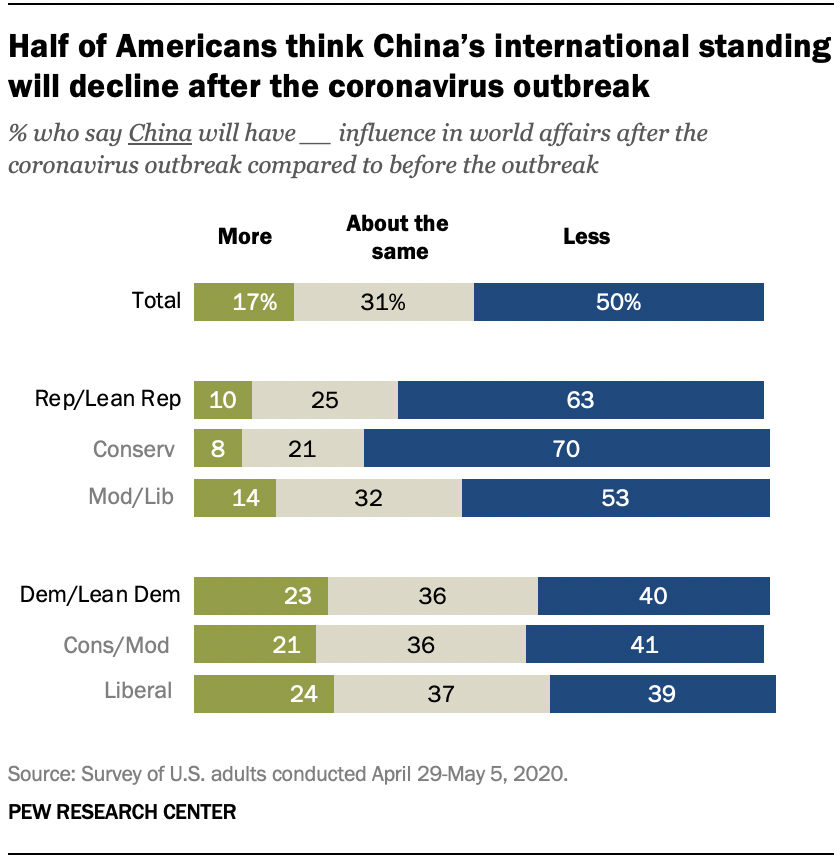
Half of Americans expect China’s global influence to wane after the pandemic. China’s response to the virus has been met with disapproval by many Americans, half of whom believe the country’s international reputation will take a hit as a result of the virus. About a third (31%) of Americans think China’s influence will remain the same, and roughly a fifth (17%) expect it will grow.
A sizable majority of Republicans and Republican-leaning independents think Chinese influence will be negatively impacted by the pandemic, compared with only four-in-ten Democrats and independents who lean toward the party.
On the other hand, Democrats are about twice as likely as Republicans to expect China’s power to increase after the outbreak.
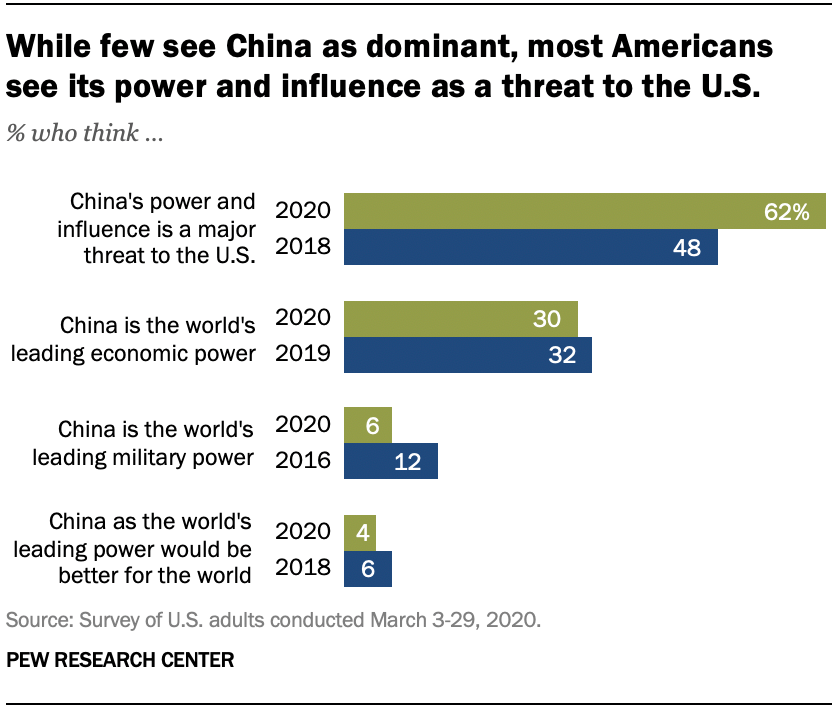
Americans’ perceptions of China’s military strength relative to other major military powers have also fallen. Just 6% of Americans now view China as the world’s top military power – down from 12% in 2016 – though three-in-ten still see China as the leading economic power. And only 4% of Americans think a situation in which China is the world’s leading power would be better for the world than one in which the U.S. is dominant.
Still, many Americans see Chinese power and influence as a major threat to the U.S. That share has climbed 14 percentage points since 2018.
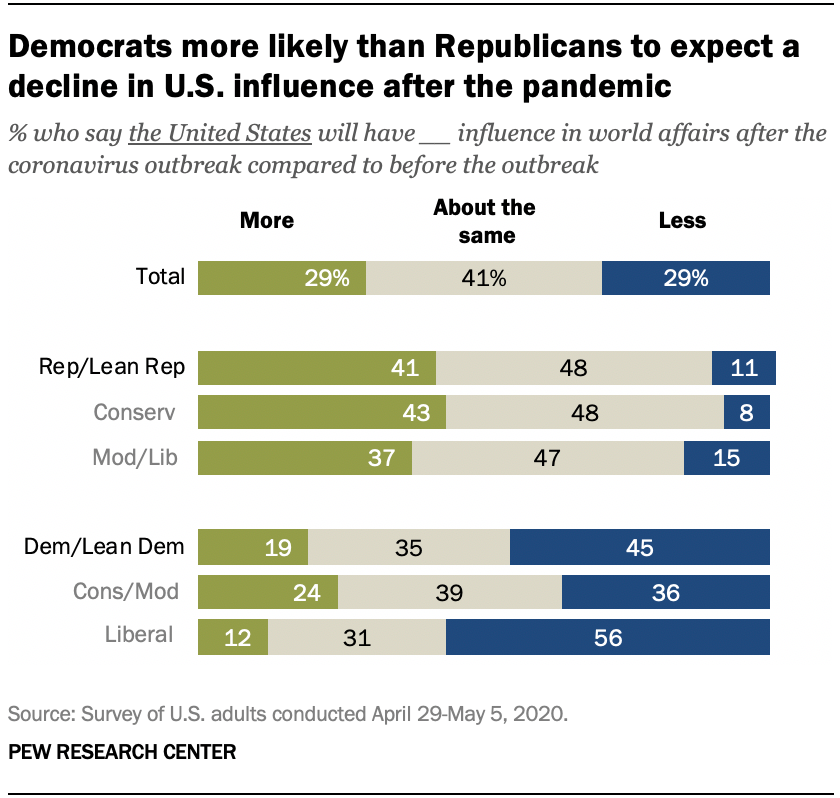
Many Americans say the outbreak will have no impact on their country’s international standing. The largest share of Americans (41%) expect U.S. influence in world affairs to be about the same after the coronavirus outbreak compared to beforehand. The rest are evenly split, with 29% saying the U.S. will have more influence and less influence, respectively.
Republicans and Republican-leaning independents are more likely than Democrats and Democratic leaners to think the U.S. will have more influence in world affairs, while Democrats are more likely than Republicans to think their country’s international standing will decline.
Meanwhile, a clear majority of liberal Democrats think the U.S. will emerge from the pandemic with its international reputation diminished.
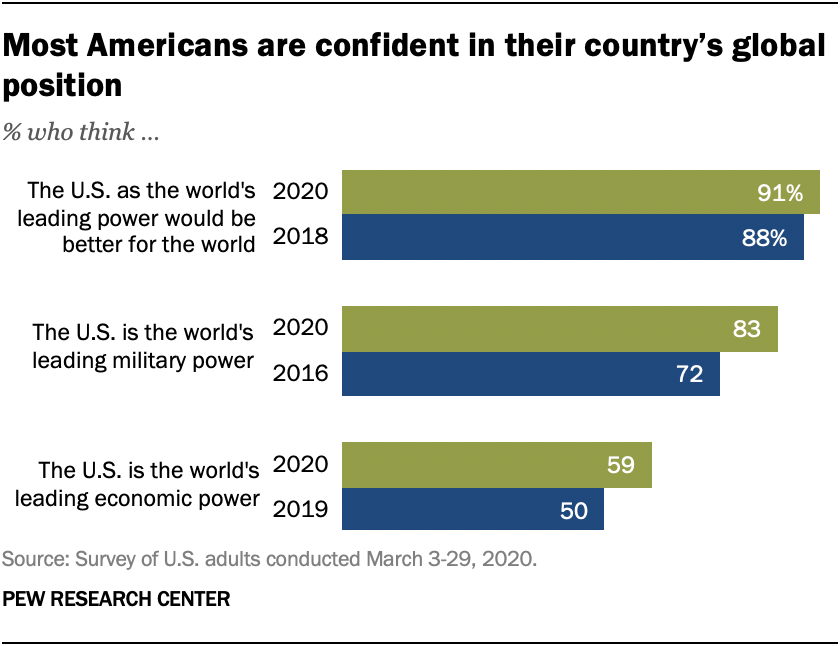
Despite relatively few Americans expecting an expansion of U.S. influence after the pandemic, this year has seen a marked increase in the shares that see the U.S. as a top power, both economically and militarily. About six-in-ten Americans think their country has the world’s strongest economy, increasing from only half in 2019. Similarly, about eight-in-ten think the U.S. is the world’s leading military power, an increase from 72% in 2016. In addition, an overwhelming majority of Americans agree that the world would be better off with the U.S. as the leading power, rather than China.
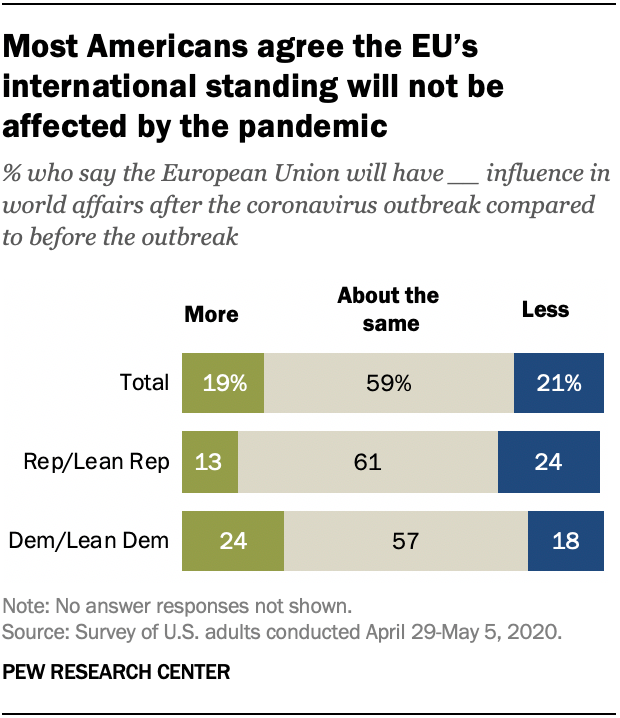
Most expect the European Union’s influence in world affairs to be unchanged by the pandemic. A majority of Americans say the EU will emerge from the pandemic with roughly the same amount of influence in world affairs as it had beforehand, while about a fifth think its position will improve and a similar share expect its power to decline.
Republicans and Republican-leaning independents are more likely than Democrats and Democratic leaners to think the EU’s influence will be weaker after the outbreak, while Democrats are more likely than Republicans to think it will be stronger.
Currently, only 4% of Americans consider the EU the world’s dominant economy.
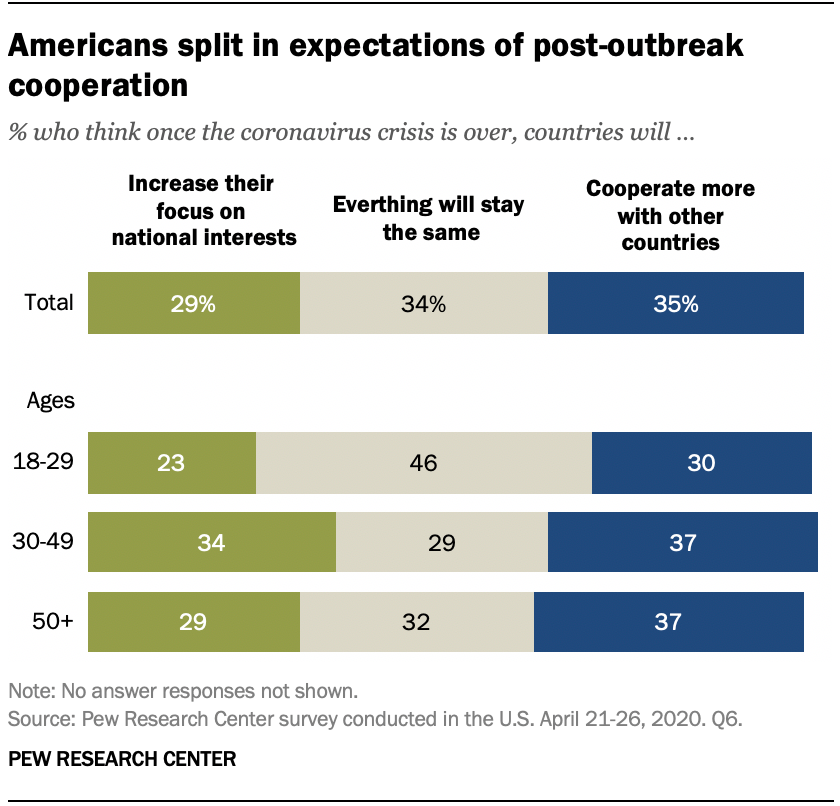
There is no consensus on the future of global cooperation. Americans are about evenly split in their expectations on the direction of international cooperation after the outbreak, with 35% expecting countries to increase their focus on cooperation after the outbreak, 29% expecting more focus on countries’ own national interest and 34% expecting no change in the extent to which countries cooperate with one another.
While Americans are largely split on whether they think the outbreak will result in enhanced global cooperation, most agree that cooperation is a priority for their country. About six-in-ten (62%) think many of the problems facing the U.S. can be solved by working with other countries. Similarly, 61% think the U.S. should consider the interests of other countries rather than following its own interests alone.
Adults under 30 are more likely than older adults to expect no changes in international cooperation to result from the outbreak – 46% of Americans ages 18 to 29 think the status quo will be maintained, compared with only about a third of 30- to 49-year-olds and those 50 and older.